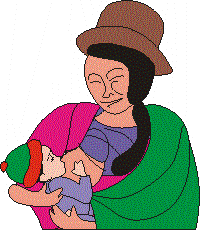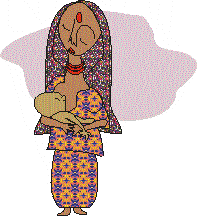| Support for Breastfeeding Rights
The Convention of the Rights of the Child (Article 24) states that it is the right of children to enjoy the highest attainable standard of health, that governments shall ensure provision of nutritious food, and that parents and children have information about nutrition and the advantages of breastfeeding. (191 countries are parties to it.)
The International Covenant on Economic, Social and Cultural Rights endorses the right to food and to health. General Comment 12 on the Right to Adequate Food (Article 11) states, "Measures may therefore need to be taken to maintain, adapt or strengthen dietary diversity and appropriate consumption and feeding patterns, including breast-feeding..." (142 countries are parties to it.)
The Convention on the Elimination of all Forms of Discrimination Against Women says that women shall have appropriate services in connection with pregnancy and lactation (breastfeeding). (165 countries are parties to it.)
The ILO Maternity Protection Convention No. 3 (1919) and No. 103 (1952) say that a woman should be provided with at least 12 weeks of paid leave and breastfeeding/nursing breaks on paid time after returning to work. (33 countries have ratified No. 3 and 37 have ratified No. 103. Several countries have provisions that go beyond the ILO Conventions, but still have not ratified them). By WBW/August 2000,
a revised Convention will have been approved at the ILO Conference of June 2000.
The International Code of Marketing of Breastmilk Substitutes limits the ways breastmilk substitutes, bottles and teats can be marketed and highlights health care workers' responsibilities in promoting breastfeeding. (The Code is law in 20 countries, a voluntary agreement in 42 countries and parts of it are law in 46 countries.)
An international convention carries binding legal obligations and duties when ratified, at which time the country is referred to as one of the states parties to the convention and even future governments are bound to abide by it. A declaration is not binding but must be viewed as carrying some degree of influence, at least of a moral nature. It is an expression of international consensus on an issue. It may indicate a movement that will eventually lead to adoption of a binding international treaty.
The Innocenti Declaration (1990) and declarations emerging from the following meetings are also relevant:
- The International Conference on Nutrition (1992)
- The Conference on Population and Development (1994)
- The Fourth World Conference on Women (1995)
- The World Food Summit (1996)
What are human rights?
 Human rights are those basic standards without which people cannot live in dignity. Human rights are inalienable: you cannot lose human rights any more than you can cease being a human being. Human rights are interdependent: all human rights are part of a complementary framework. Human rights are held by all persons equally, universally, and forever. Human rights are those basic standards without which people cannot live in dignity. Human rights are inalienable: you cannot lose human rights any more than you can cease being a human being. Human rights are interdependent: all human rights are part of a complementary framework. Human rights are held by all persons equally, universally, and forever.
Adapted from Human Rights USA
|





 Human rights are those basic standards without which people cannot live in dignity. Human rights are inalienable: you cannot lose human rights any more than you can cease being a human being. Human rights are interdependent: all human rights are part of a complementary framework. Human rights are held by all persons equally, universally, and forever.
Human rights are those basic standards without which people cannot live in dignity. Human rights are inalienable: you cannot lose human rights any more than you can cease being a human being. Human rights are interdependent: all human rights are part of a complementary framework. Human rights are held by all persons equally, universally, and forever.